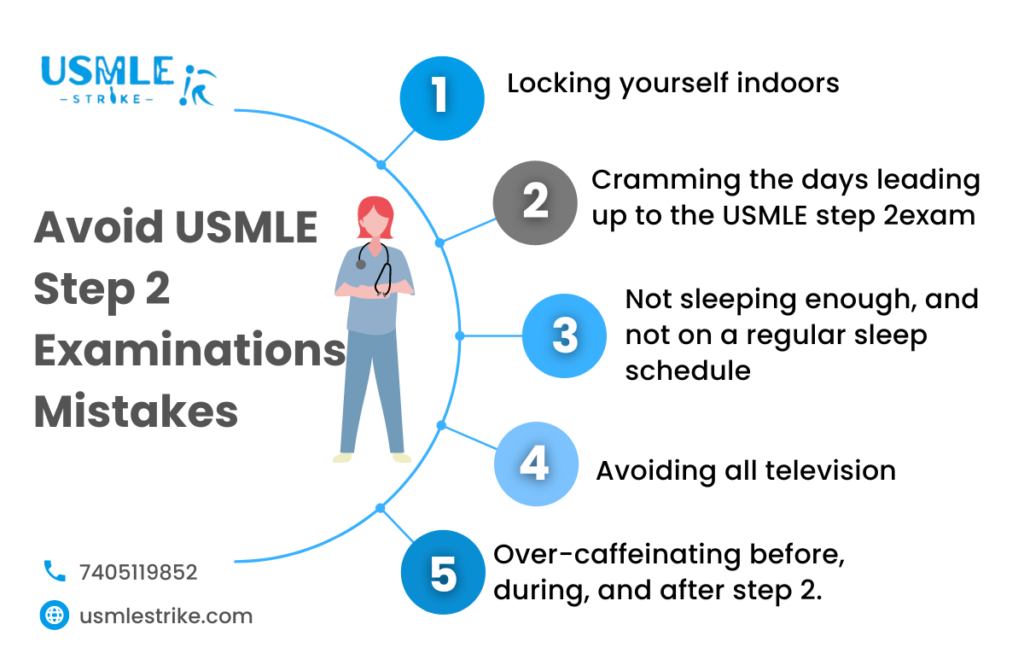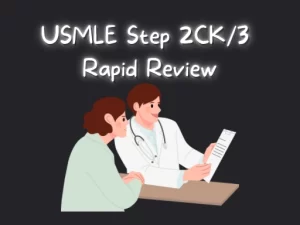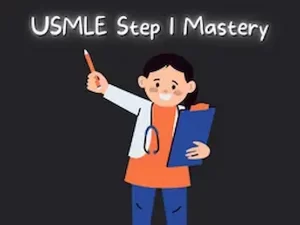Are you getting ready to take the USMLE Step 2 exam? It is important to comprehensively understand the test and prepare adequately. To help you prepare for the exam, this article explores a few USMLE step 2 practice questions. Test your knowledge and brush up on any topics that might be challenging. Good luck!
USMLE Step 2 CK Test Question Formats
- Multiple Choice Questions (MCQs): The most common format, these questions present a clinical scenario followed by multiple answer choices. You’ll need to pick the best option based on your knowledge and clinical reasoning skills.
- Sequential Item Sets: These involve a series of questions based on a single patient case. Each question will require you to apply different aspects of medical knowledge to make decisions.
- Abstract-Based Questions: You’ll be provided with a clinical study abstract, and the questions will test your ability to interpret data and apply it to clinical situations.
- Pharmacology Questions: Focused on drug mechanisms, side effects, and therapeutic uses, these questions require a strong understanding of pharmacology.
Pro Tip: Regularly practicing USMLE step 2 practice questions in these formats can significantly improve your test-taking skills.
Strategies
- Prioritize High-Yield Topics: Focus on the topics that are most frequently tested, such as internal medicine, pediatrics, and surgery. Practice these areas extensively with USMLE step 2 practice questions to maximize your score.
- Time Management: Allocate specific time slots for each question, and avoid spending too much time on difficult questions. Practicing timed sessions with our USMLE step 2 practice questions can help you refine this skill.
- Review and Reflect: After completing a set of questions, review the explanations for both correct and incorrect answers. Understanding the rationale behind each answer is crucial for improving your performance.
How does USMLE STRIKE Help You Study for Step 2 CK?
USMLE Strike is a targeted study tool designed for USMLE Step 2 CK preparation. It offers customized study plans tailored to your test date and areas of strength or weakness. The platform provides high-yield content essential for the exam, supplemented with extensive USMLE step 2 practice questions and simulated exams to familiarize you with the test format. Performance tracking tools help identify areas needing improvement, while expert-led video tutorials clarify complex concepts. Additionally, peer and expert forums offer further learning support. With mobile accessibility, USMLE Strike ensures that you can study efficiently and effectively, keeping up-to-date with the latest medical guidelines.
USMLE Step 2 Sample Questions Format
Are you ready to test your knowledge? Here are some USMLE step 2 questions to help you prepare for the exam. These USMLE step 2 practice questions cover a range of topics, such as clinical skills, physiology, and pharmacology.
- From history taking to treatment plans, these usmle step 2 practice questions will provide a comprehensive review of the material that can be found on the USMLE Step 2.
- So put your medical knowledge to the test and use these sample USMLE Step 2 practice questions to get one step closer to achieving success in your studies!
- When broadly evaluating the competency of an individual the usmle step 2 questions are based on the below subjects as per the Step 2 CK Physician Task.
- There are many other subjects accordingly but here in this article mentioned a few. If you want to know more can visit the USMLE Strike website: –
- Patient Care: History and Physical Exam
- Patient Care: Laboratory/Diagnostic Studies
- Patient Care: Diagnosis
- Patient Care: Prognosis/Outcome
- Patient Care: Health Maintenance/Disease Prevention
- Patient Care: Pharmacotherapy
- Patient Care: Clinical Interventions
- Patient Care: Mixed Management
- Practice-based Learning & Improvement
- Professionalism
- Systems-based Practice & Patient Safety
- Medical Knowledge: Applying Foundational Science Concepts

Step 2 CK Test Content
| Content Area | Percentage Range |
| General Principles of Foundational Science | 2-4% |
| Immune System | 3-5% |
| Blood & Lymphoreticular Systems | 4-6% |
| Behavioral Health | 6-8% |
| Nervous System & Special Senses | 6-8% |
| Musculoskeletal, Skin & Subcutaneous Tissue | 6-10% |
| Cardiovascular System | 8-10% |
| Respiratory System | 7-9% |
| Gastrointestinal System | 7-9% |
| Renal & Urinary Systems & Male Reproductive | 4-6% |
| Pregnancy, Childbirth, & the Puerperium | 4-6% |
| Female Reproductive System & Breast | 4-6% |
| Endocrine System | 4-6% |
| Multisystem Processes & Disorders | 4-6% |
| Biostatistics & Epidemiology/Population Health | 3-5% |
| Social Sciences (Legal/Ethical Issues & Professionalism/Systems-based Practice & Patient Safety) | 10-15% |
Step 2 CK Physician Task/Competency Specifications
| Task Component | Percentage Range |
| Patient Care: Diagnosis | |
| Laboratory/Diagnostic Studies | 13-17% |
| Diagnosis | 16-20% |
| Prognosis/Outcome | 5-9% |
| Patient Care: Management | |
| Pharmacotherapy | 8-12% |
| Clinical Interventions | 6-10% |
| Communication/Professionalism | 5-7% |
| Systems-based Practice/Patient Safety | 5-7% |
| Practice-based Learning & Improvement | 3-5% |
Step 2 CK Discipline Specifications
| Discipline | Percentage Range |
| Medicine | 50-60% |
| Surgery | 25-30% |
| Pediatrics | 20-25% |
| Obstetrics & Gynecology | 10-20% |
| Psychiatry | 10-15% |
USMLE Step 2 Board Review Topics Covered
- Internal Medicine: Cardiology, pulmonology, gastroenterology, nephrology, and more.
- Pediatrics: Neonatology, infectious diseases, developmental milestones, and pediatric emergencies.
- Surgery: Preoperative and postoperative care, surgical emergencies, and common procedures.
- Obstetrics and Gynecology: Prenatal care, labor and delivery, and gynecologic disorders.
- Psychiatry: Mood disorders, anxiety disorders, psychopharmacology, and patient management.
Our USMLE step 2 practice questions comprehensively cover these topics, giving you a well-rounded review.
USMLE Step 2 CK Board Review Questions
- Realistic Practice: Our board review questions are designed to mimic the actual Step 2 CK exam, providing you with an authentic testing experience.
- In-Depth Explanations: Each question is accompanied by detailed explanations that help reinforce your knowledge and clarify any misconceptions.
- Continuous Updates: Our question bank is regularly updated to reflect the latest exam trends and changes, ensuring that you’re always practicing with the most relevant material.
By consistently practicing USMLE step 2 practice questions, you’ll build the confidence needed to excel on exam day.
Read also: Preparation for Residency Interview
Few Sample USMLE Step 2 Practice Questions:
Patient Care: Diagnosis: Question 1
An x-ray of the left knee identifies calcification of the synovium. Which are related to likely diagnosis?
(A) Deep venous thrombosis
(B) Gonorrhea
(C) Gout
(D) Hemarthrosis
(E) Pseudogout
(F) Septic arthritis
(Answer: E)
Patient Safety: Question 2
A woman around 45 years old is hospitalized due to Staphylococcus aureus endocarditis with persistent bacteremia. During his clinical round, a pharmacy student notices that the patient skipped two doses of her scheduled antibiotic last week but is unsure why.
The physician and health provider are not informed of these missed doses, and the student does not mention her observation. Which of the following measures is most likely to improve communication within this interdisciplinary healthcare team?
(A) Encourage questions from all team members
(B) Implement a checklist for standardizing patient rounds
(C) Use computers during rounds to review medications
(Answer: A)
Question 3
A 10-year-old boy returns for a follow-up checkup two days after visiting the emergency department due to hives, hoarseness, and light-headedness following a bee sting. The symptoms started 15 minutes post-sting, lasted about 60 minutes, and resolved without treatment. Notably, this is the third bee sting in the past year, with each reaction escalating in severity. Despite a normal examination, what would be the most suitable recommendation to prevent potential future complications and fatalities associated with this condition?
(A) Avoid areas known to have bees
(B) Avoid wearing colorful clothing outside
(C) Carrying diphenhydramine tablets
(D) Carrying self-injectable epinephrine
(E) Seek immediate medical attention following any future sting
(Answer: D)
Question 4
A 28-year-old woman, currently 26 weeks pregnant with her first child, presents for a routine prenatal visit. Her pregnancy has been without complications up to this point. She reports normal fetal movement and has gained 8.2 kg (18 lb) since conception. Her pre-pregnancy weight was 83.9 kg (185 lb), and she is 165 cm (5 ft 5 in) tall, giving her a pre-pregnancy BMI of 30.5 kg/m². Her blood pressure is 126/80 mm Hg. The fundal height measures 27 cm, aligning with her gestational age, and the fetal heart rate is 140 beats per minute. No proteinuria is noted. A 50-g oral glucose challenge test shows a serum glucose level of 180 mg/dL after one hour.
The following day, after fasting, her serum glucose level is 120 mg/dL. What is the most appropriate subsequent step in her management?
(A) Begin insulin therapy
(B) Begin oral antihyperglycemic medicatio
(C) Obtain hemoglobin A1c, determine renal function, rule out proliferative retinopathy and establish home blood glucose monitori
(D) Perform a 3-hour 100-g oral glucose tolerance test
(E) Provide diet education and establish home blood glucose monitoring
(Answer is D)
Question 5
A 32-year-old woman with type 1 diabetes mellitus has experienced worsening renal failure over the past 2 years and has not yet initiated dialysis. Physical examination reveals no abnormalities. Her laboratory results show a hemoglobin level of 9 g/dL, a hematocrit of 28%, and a mean corpuscular volume (MCV) of 94 μm³. A blood smear reveals normochromic, normocytic red blood cells. What is the most likely underlying cause of her anemia?
(A) Acute blood loss
(B) Chronic lymphocytic leukemia
(C) Erythrocyte enzyme deficiency
(D) Erythropoietin deficiency
(Answer: D)
Question 6
A 6-year-old boy comes to the ED with sudden onset of severe right-sided lumbar pain for 1 hour. He’s been vomiting twice and at triage is afebrile. Physical exam reveals flank tenderness. Urinalysis shows microscopic hematuria and mild leukocytes. A renal and urinary tract ultrasound shows right-sided hydronephrosis without obvious stones.What is the most appropriate next diagnostic step?
- A) Non-contrast CT abdomen and pelvis
- B) MRI abdomen
- C) Intravenous pyelogram
- D) Radionuclide renal scan
- E) Start IV hydration and serial ultrasounds
(Answer: A)
Question 7
A 32-year-old woman with type 1 diabetes and 2-year history of chronic kidney disease presents for evaluation. Lab results: Hb 9 g/dL, Hct 28%, MCV 94 µm³, normocytic, normochromic anemia. Peripheral smear is unremarkable.
Which most likely explains her anemia?
- A) Acute blood loss
- B) Chronic lymphocytic leukemia
- C) Enzyme deficiency in red blood cells
- D) Decreased erythropoietin production
- E) Autoimmune hemolysis
(Answer: D)
Question 8
Vignette: (SOAP note format, abridged)
S: “My roommate might overdose again.” Found holding empty bottle of acetaminophen, saying, “I just want to die.”
O: Vitals: normal. Liver not palpable. Labs pending. Alert and oriented.
Assessment: Suspected intentional acetaminophen overdose.
Plan: Next best step?
Choices:
- A) Check serum acetaminophen level and start N-acetylcysteine
- B) Activate poison control, observe
- C) Gastric lavage
- D) Whole bowel irrigation
- E) Administer activated charcoal only
(Answer: A)
Question 9
A 60-year-old man with a history of MI is scheduled for non‑cardiac surgery. He takes daily low-dose aspirin and clopidogrel. Surgeon is concerned about bleeding risk; cardiologist is worried about stent thrombosis.
Which is the best preoperative strategy?
- A) Discontinue all antiplatelet agents 7 days before surgery
- B) Continue aspirin; stop clopidogrel 5 days before surgery
- C) Stop aspirin; switch to low-molecular-weight heparin
- D) Add ticagrelor and continue both
- E) Continue clopidogrel; stop aspirin
(Answer: B)
Question 10
A 28-year-old at 26 weeks’ gestation has a 1‑hour 50 g glucose screen = 180 mg/dL (high). Next-day fasting glucose is 120 mg/dL (elevated).
Next step?
- A) Start insulin
- B) Give oral hypoglycemics
- C) Check HbA1c, kidney/eye exams, and begin home monitoring
- D) Perform a 3‑hour 100 g oral glucose tolerance test
- E) Provide dietary counseling and self-monitor glucose
(Answer: D)
Tips For Answering The USMLE Step 2 Practice Questions
When answering USMLE Step 2 practice questions, it’s essential to approach each question thoughtfully. Take your time and carefully read all the details provided. Consider all the information in the question, as well as any related topics that may apply. This strategy helps you build connections between clinical scenarios and potential solutions.
Additionally, review your understanding of the topics linked to USMLE Step 2 eligibility requirements. Developing possible answers before selecting the best one ensures a structured and confident approach to each question.
- Make sure you understand why each answer is correct or incorrect so that when you get to the actual USMLE Step 2 exam, you can confidently select the right answer.
- Lastly, don’t forget to use common sense and draw on your own experiences whenever possible!
Who Needs the USMLE Step 2 CK Sample Test Questions?
- Medical Students: Those preparing for the Step 2 Clinical Knowledge (CK) exam to assess their clinical science knowledge.
- International Medical Graduates (IMGs): IMGs aiming to practice in the U.S. and meet ECFMG certification requirements.
- Residency Applicants: Students seeking to strengthen their residency applications with competitive Step 2 CK scores.
- USMLE Repeat Takers: Candidates retaking the exam to improve their scores.
- Medical Educators: Teachers and mentors helping students prepare for the exam.
- Test Prep Companies: Organizations designing study materials and mock tests.
- Healthcare Enthusiasts: Individuals enhancing their clinical knowledge base.
How USMLE Strike Question Bank Helps You Increase Your Score
The USMLE Question Bank by USMLE Strike is designed to boost your exam performance effectively. Here’s how it helps:
- Comprehensive Coverage: Covers high-yield topics and frequently tested concepts.
- Realistic Practice: Mimics the actual USMLE exam format, improving time management and test-taking skills.
- Detailed Explanations: Provides clear answers and rationales to strengthen your understanding.
- Performance Tracking: Identifies weak areas, helping you focus on topics needing improvement.
- Updated Content: Regularly revised to match the latest USMLE exam pattern.
With the USMLE Question Bank from USMLE Strike, created under the expert guidance of Dr. Apurva Popat, you gain the confidence and knowledge needed to achieve a higher score!
Conclusion
In these few sample USMLE Step 2 practice questions offer a great way for medical students to test their knowledge and assess their preparedness for the exam. With these questions as a guide, aspiring physicians can identify areas of weakness and reinforce their current understanding of key topics.
Read Also: USMLE Step 2CK Course





